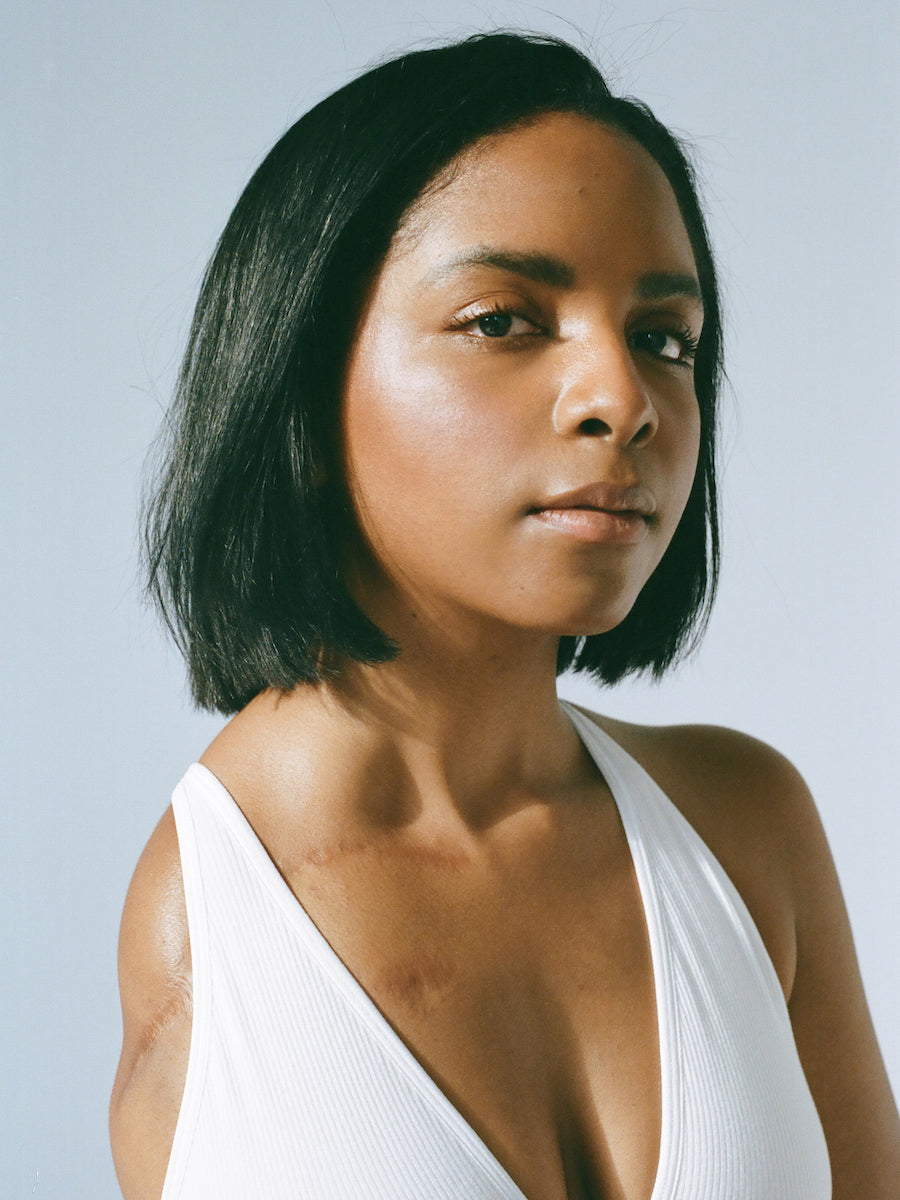RITUALS
Maya Moore



I believe beauty is an ever-evolving process of coming into your own. It’s learning to love and appreciate every part of yourself, especially the seen and unseen parts you may have been told aren’t beautiful—for me, this means my scars and my silhouette. Most importantly, I believe we’re arbiters of our own definitions and those definitions can change with time.
I’m Maya Moore, a 28-year old cancer survivor and dark humor enthusiast. I’ve never heard a dad joke or seen a vintage Tom Ford piece I didn’t love. I love Mexican food and I have a big personality. But I’m from a small city—New Britain, Connecticut—and I currently travel between there and New York as I try to grow my business and recenter my life in the aftermath of this pandemic.
I would have to say that the experience which has shaped me most was having my amputation in 2011, after battling cancer for four years. It radically shifted the way I categorize the things of importance in my life and my relationship with myself. I went from hating my body to being repulsed by it, to loving and being in awe of everything it has carried me through.
Confidence and acceptance have become very prominent in the way I define beauty now. I used to wear such heavy makeup when I was younger because I conflated beauty with covering up any “flaws”. Similarly, for nine years—from my amputation in 2011 until 2020—I never left the house without wearing my prosthetic. Over time, I’ve shifted from using makeup or even my prosthetic as a way to hide. They play a supporting role in my life now instead of a dominating one.
I believe everyone deserves to see themselves reflected in fashion and beauty. We know a lack of representation has a ripple effect both socially and psychologically. This is especially true for disabled people. The primary representations being in medical textbooks, instead of in media, has made me feel like I could never fit the standard of beauty. It perpetuates the stereotype that disabled people don’t lead meaningful, fulfilling lives.
The beauty industry needs to be more intentional, and authentic inclusion is intentional. This means not only having disabled people star in ads but giving them seats at the table. I believe the only way the beauty industry can avoid tokenism is to invest in marginalized communities; listen to us and hire us.
I feel most beautiful when I’m happiest, whether it’s waking up with my girlfriend in the morning or when I catch a glimpse of myself when I’m all dressed up and out with friends. I feel most alive when I feel fulfilled. This last year in my career has brought me closer to what I feel is my purpose and has felt really fulfilling. I also feel alive whenever I’m around people I love.
My mom is the person who has shaped me most. She is the hardest working person I know, which is where I get my drive from. She always made sure my siblings and I were surrounded by ambitious women who were passionate about their career fields. Now I have a profound appreciation of hard work and I believe in celebrating your own success, thanks to her.
I hope to be an authority in the field of fashion and beauty when it comes to inclusion and accessibility. I hope that advocacy work is a cornerstone in my life and that my business grows in tandem with my values. I hope to be a mom, sister, daughter, wife, friend, and partner that the people in my life are proud of.
Where I am right now—I’m just proud of how far I’ve come in the last ten and even last five years. There’s nothing better than looking back at old photos and journals and truly realizing how much I’ve grown from the person that was too ashamed to have her photo taken or to embrace her intersectionality. I’m working on letting go of regret. Once I started coming into my own I started to regret not having gotten to this place of self-confidence and actualization sooner. In therapy, I’ve been working on appreciating the journey that’s gotten me here.
My greatest hope for the world and humanity is that we realize apathy and indifference will be our downfall. I hope we realize that we all have a collective stake in fixing the climate crisis and addressing the social issues that have entrenched inequality, ableism, and racism in our society. I hope we are able to agree to disagree and show up to make this world a better place for everyone.
From what I share on social media, I hope others take away that disabled life is beautiful and no less fulfilling than the life of someone who is not disabled. I hope they see that making beauty and fashion more accessible or lifting up disabled voices on social media doesn’t come at the detriment of anyone else. Inclusivity benefits everyone, not just marginalized communities.
I’m in awe of so many others commanding attention and action in the disability space. I so admire Imani Barbarin, a multi-hyphenate disability blogger and advocate, Sophie Butler, a model, advocate, and influencer, and Marta Elena Cortez-Neavel, who is an advocate and authority in the space of accessibility and fashion—and has their own line. They have each inspired me in regards to speaking out, taking up space, and living a beautifully influential life.
MAYA MOORE featured with the REGENERATION MIST, RITUAL SERUM and BIOACTIVE MASK. Photographed by CAROLYNE LORÉE TESTON.